Simplify Your Life

As each day seems to bring more bad news about the economy, people around the country are learning tough lessons about their money. "Having the best things is no substitute for having the best life," Oprah writes in her What I Know for Sure column in the March 2009 issue of O, The Oprah Magazine.
People with and without jobs are using our national financial crisis to get back to basics. Is it possible to live with less? What truly matters?
If you're in debt, one way to see what it's like to live with less is to take Suze Orman's three-step money pledge:
People with and without jobs are using our national financial crisis to get back to basics. Is it possible to live with less? What truly matters?
If you're in debt, one way to see what it's like to live with less is to take Suze Orman's three-step money pledge:
- Don't spend any money for a day.
- Don't use your credit card for a week.
- Don't eat out in restaurants for a month.

Jennifer and David, parents of two, are almost done with their third week on Suze's pledge.
Jennifer says the first goal—not spending any money for a day—was easy. The second goal—not using credit cards for a week—didn't really faze them. "We never had a problem with using a credit card," David says.
"We can't pay for it today, we don't get it today," Jennifer adds.
The third goal—not eating at a restaurant for a month—has been hard, but they say there are benefits to staying home. There's more time to talk, play games or watch movies as a family.
The experience has taught them just how little they need to live and how much they had been spending unnecessarily, Jennifer says. "We stood back, and we looked at our budget," she says. "We looked to see what we have been doing, and it hasn't been smart."
Jennifer says the first goal—not spending any money for a day—was easy. The second goal—not using credit cards for a week—didn't really faze them. "We never had a problem with using a credit card," David says.
"We can't pay for it today, we don't get it today," Jennifer adds.
The third goal—not eating at a restaurant for a month—has been hard, but they say there are benefits to staying home. There's more time to talk, play games or watch movies as a family.
The experience has taught them just how little they need to live and how much they had been spending unnecessarily, Jennifer says. "We stood back, and we looked at our budget," she says. "We looked to see what we have been doing, and it hasn't been smart."
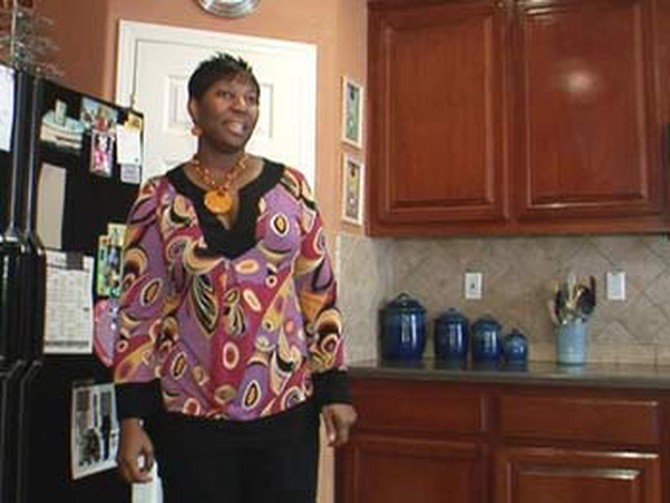
Widowed mom Candice lives in California with her sons, Derek and Darrien, in a seven-bedroom home. Their closets are full of clothes they don't wear, and Candice has $500 Jimmy Choo shoes she has never worn. She even refinanced their home so she could pay off her car...so she could purchase a new truck.
While Candice and her sons eat out almost every night, she still spends $400 a week on groceries. Much of that food ends up wasted, thrown away after it expires on the shelf or in the refrigerator.
Candice wrote in to The Oprah Show, pleading for someone to help her learn how to be happy with less: "I submit myself to you—mind, body, soul and shoes."
While Candice and her sons eat out almost every night, she still spends $400 a week on groceries. Much of that food ends up wasted, thrown away after it expires on the shelf or in the refrigerator.
Candice wrote in to The Oprah Show, pleading for someone to help her learn how to be happy with less: "I submit myself to you—mind, body, soul and shoes."
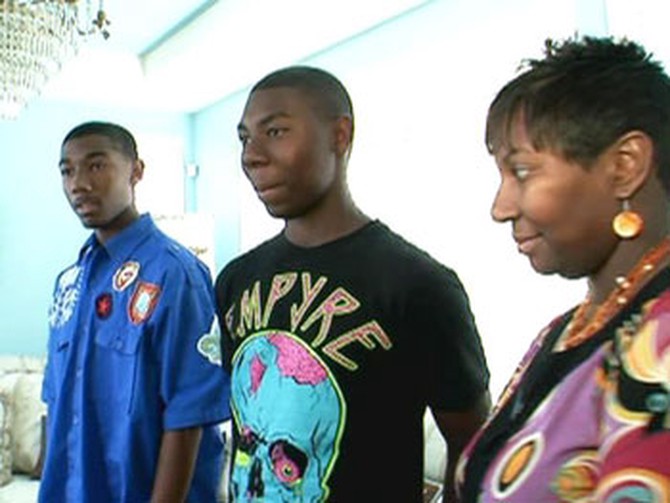
Candice, Derek and Darrien agree to a challenge that will force them to live more consciously for a week. Your family can do it too!
- Limit driving. Derek and Darrien have to start making the seven-minute walk to school.
- No shopping online or in stores, except $100 for groceries for the entire week.
- No ordering out, getting takeout or going out to restaurants.
- Turn off the TV and Internet for the week.
- Candice has to box up everything from her closet that she has not worn in two months and put it in storage for the rest of the week.

By making changes to live with less, Candice must confront difficult emotional issues. She reveals that her husband died in 1997 while saving one of their sons from drowning during a fishing trip. Candice says after his death, she began spending money as a way to demonstrate her love to her children and in an attempt to soothe her own pain.
"I've been hiding behind the shoes and the house and the clothes for so long. ... Since I lost my husband, it's all been about masking the pain," she says. "I didn't want my friends to see that. I didn't want my children to see that. I didn't want them to know that. So I would just keep shopping so I could look good on the outside to cover up what was on the inside."
With the challenge, Candice says she had light bulb moments beginning on the very first day. "No TV allowed me to sit down with my children and just have a conversation about their day, my day. We had dinner together, and there were no outside distractions," she says. "There has been a huge shift in my thinking. I know that I don't need the stuff. I know my children don't need the stuff. All I ever needed was them, and all they ever needed was me. And that's been the most amazing feeling."
See how Candice cleared out her closets!
"I've been hiding behind the shoes and the house and the clothes for so long. ... Since I lost my husband, it's all been about masking the pain," she says. "I didn't want my friends to see that. I didn't want my children to see that. I didn't want them to know that. So I would just keep shopping so I could look good on the outside to cover up what was on the inside."
With the challenge, Candice says she had light bulb moments beginning on the very first day. "No TV allowed me to sit down with my children and just have a conversation about their day, my day. We had dinner together, and there were no outside distractions," she says. "There has been a huge shift in my thinking. I know that I don't need the stuff. I know my children don't need the stuff. All I ever needed was them, and all they ever needed was me. And that's been the most amazing feeling."
See how Candice cleared out her closets!
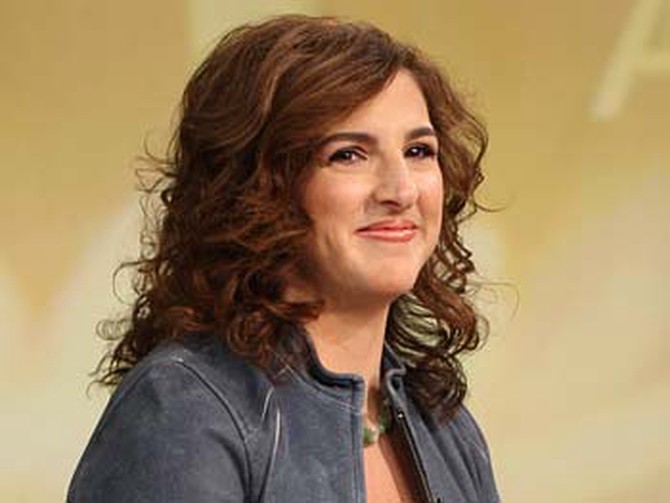
As a reformed shopaholic, Mary Carlomagno, author of Secrets of Simplicity, says she can relate to women like Candice. One day, Mary says her excessive spending knocked her over the head—literally and figuratively. While getting ready for work, she says boxes fell off a closet shelf and landed on her head. "That was a not-quite-subtle message for me to change my life a bit," she says. "I said: 'Something's got to give here. This is a little crazy. How many pairs of black pumps do I really need?'"
From that moment on, Mary says she started to take stock of her life and identify areas that seemed off balance. As an experiment, she began giving up one thing—like alcohol, elevators or shopping—each month. "When you make these subtle changes, and you practice it every day, it really opens up space," she says. "When you create space in your life, something new can come in."
Watch Mary discuss the importance of simplicity after the show.
Want to start simplifying? Mary says you shouldn't think of the process as a punishment. "It can't be, 'Oh, you're taking this away from me,'" she says. "It's: 'What am I opening up? What am I going to gain from this experience?' And with this experience, you gain the appreciation for the things in life you are so blessed to have."
From that moment on, Mary says she started to take stock of her life and identify areas that seemed off balance. As an experiment, she began giving up one thing—like alcohol, elevators or shopping—each month. "When you make these subtle changes, and you practice it every day, it really opens up space," she says. "When you create space in your life, something new can come in."
Watch Mary discuss the importance of simplicity after the show.
Want to start simplifying? Mary says you shouldn't think of the process as a punishment. "It can't be, 'Oh, you're taking this away from me,'" she says. "It's: 'What am I opening up? What am I going to gain from this experience?' And with this experience, you gain the appreciation for the things in life you are so blessed to have."
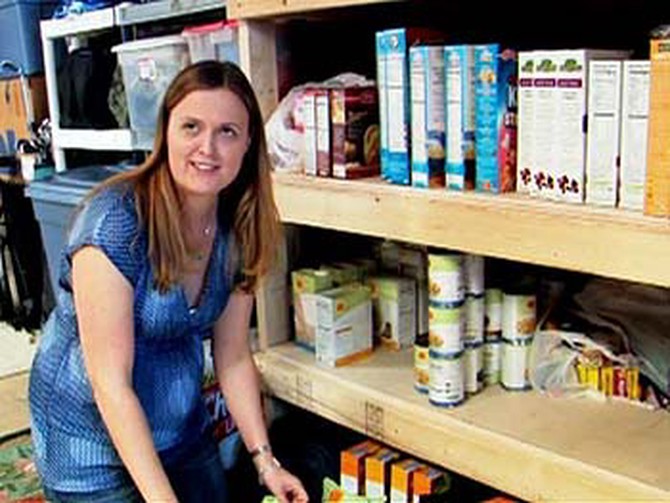
Kay Jean, a wife and mother of two from Illinois, says that when she looks around her home, she regrets all the stuff she's purchased over the years. Though most of her cabinets and shelves are loaded with nonperishable food and drinks, Kay Jean says she still shops almost every day, stockpiling items for her family. "I think I got 50 or 60 boxes of granola bars, and 10 bags of chips," she says. "All this excess can put my life out of balance because I'm trying to keep my family secure."
Fifteen years ago, Kay Jean says everything she owned could fit into two suitcases. "I was really happy," she says. Now, she wonders if her husband, Jon, and their children would be better off if they learned to live with less.
To help this family simplify their lives, Oprah challenged them to follow six rules for one week:
Fifteen years ago, Kay Jean says everything she owned could fit into two suitcases. "I was really happy," she says. Now, she wonders if her husband, Jon, and their children would be better off if they learned to live with less.
To help this family simplify their lives, Oprah challenged them to follow six rules for one week:
- No computer.
- No spending, except $25 for perishables like bread, milk and eggs.
- No eating out.
- No car. The children must walk to school, and Jon must carpool to work.
- No TV at night. They must do a family activity that doesn't involve the television.
- Think about those struggling to make ends meet who may need what they don't.
Keep Reading
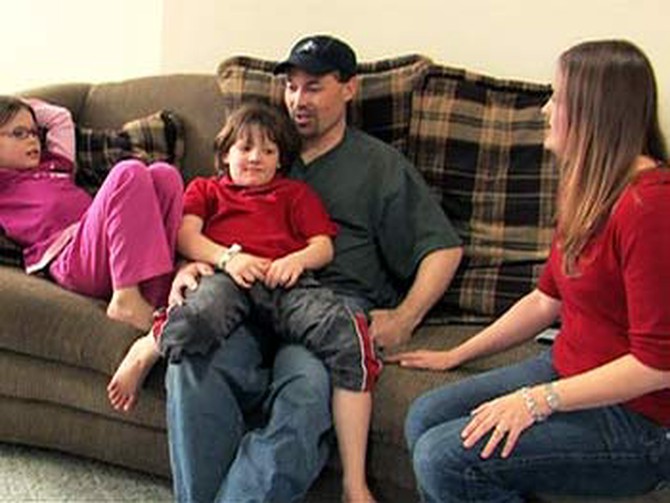
At first, Kay Jean and Jon are met with resistance from their children. Carter, their young son, is upset when his parents shut down the computer and ask him to walk the two blocks to school.
Then, on the second day of the challenge, Oprah adds another rule to the list. The children are asked to choose five toys from their huge supply to play with for the rest of the week, which doesn't go over well with Carter.
"Carter is crying all night saying, 'This is boring' and 'This is going to be awful,'" Kay Jean says. "He's just worried about the stuff—the stuff that I bought. So I need to take accountability for what I've created. I need to take accountability for all the stuff that I've bought them."
Then, on the second day of the challenge, Oprah adds another rule to the list. The children are asked to choose five toys from their huge supply to play with for the rest of the week, which doesn't go over well with Carter.
"Carter is crying all night saying, 'This is boring' and 'This is going to be awful,'" Kay Jean says. "He's just worried about the stuff—the stuff that I bought. So I need to take accountability for what I've created. I need to take accountability for all the stuff that I've bought them."
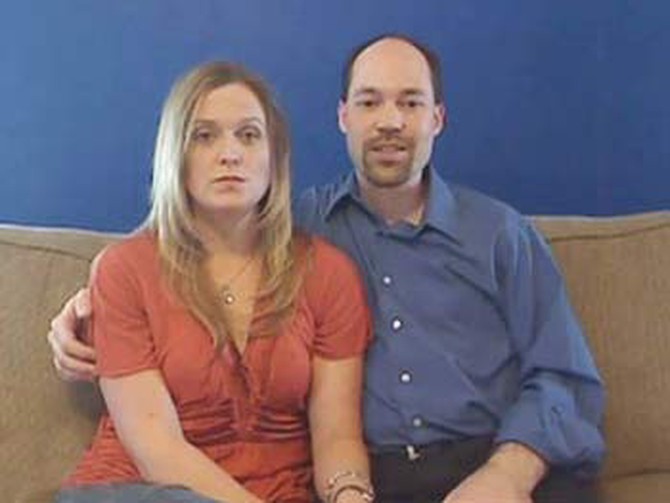
After a day or two of adjustments, Kay Jean says everyone in the family learned to appreciate the simple life. "I think the first day or two, it's a shock," Kay Jean says. "But we really have adjusted, and I think as long as you don't treat this as a punishment ... it really is a better life."
Now, Kay Jean says her children look forward to their walk to and from school. "They love it," she says. "It's just a great way for a natural flow of conversation and to connect with the neighbors."
They also enjoy evening activities that don't revolve around electronics. One night, Kay Jean says her children passed time by painting pictures and reading stories. "They had a wonderful time, and there was no bickering," she says. "It was just a lot of dialogue—all four of us talking. It was great."
Jon says he also sees a big difference. "It seems like the kids are less worried about things and spending time on the computer," he says. "At nighttime, we'll eat dinner together, and the kids, you know, they'll tell you about their day. ... You can actually start a conversation and help them with their homework. You have a better understanding of what's going on in their life."
Now, Kay Jean says her children look forward to their walk to and from school. "They love it," she says. "It's just a great way for a natural flow of conversation and to connect with the neighbors."
They also enjoy evening activities that don't revolve around electronics. One night, Kay Jean says her children passed time by painting pictures and reading stories. "They had a wonderful time, and there was no bickering," she says. "It was just a lot of dialogue—all four of us talking. It was great."
Jon says he also sees a big difference. "It seems like the kids are less worried about things and spending time on the computer," he says. "At nighttime, we'll eat dinner together, and the kids, you know, they'll tell you about their day. ... You can actually start a conversation and help them with their homework. You have a better understanding of what's going on in their life."
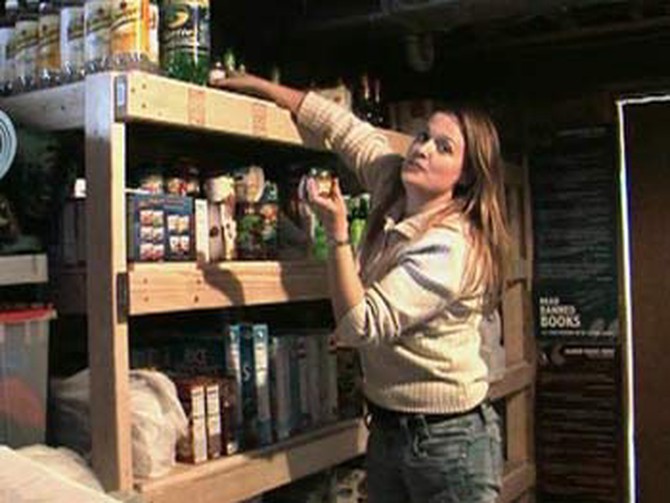
By following the rules, Kay Jean also discovered something about herself. As part of her assignment, she reached out to the World Relief Agency to offer donations to families in need. "They need a vacuum cleaner, and she said it would probably be shared by all 10 families in that complex," she says. "I have, like, four vacuums."
In the basement, Kay Jean adds shampoo, rice, baby food, crackers, chips, pasta and a hair dryer to the donation pile. "This is making a dent in my pantry," she says. "I still have plenty. Right now, I'm not worried about my food storage supply. I'm feeling good. I feel like I have a purpose."
In the basement, Kay Jean adds shampoo, rice, baby food, crackers, chips, pasta and a hair dryer to the donation pile. "This is making a dent in my pantry," she says. "I still have plenty. Right now, I'm not worried about my food storage supply. I'm feeling good. I feel like I have a purpose."

Oprah says the inspiration for this show came from a mother featured in the January 2009 issue of O, The Oprah Magazine.
Before going "back to basics," Kristen lived with her husband and two children in a five-bedroom, 3,600-square-foot home. "I had memberships at three different country clubs and everything that you're supposed to want when you grow up," she says. "I started to feel like something was wrong. ... I wanted to make a change, but I didn't know how you could go from this grand life in this big house and all this stuff to something simpler."
Read Kristen's story in O, The Oprah Magazine.
Unhappy and looking for more, Kristen and her husband filed for divorce. Then, in 2008, she moved her two children from their spacious home to a tiny, 800-square-foot cottage in the woods. "This life is back to basics," she says. "It's the simple things."
Before going "back to basics," Kristen lived with her husband and two children in a five-bedroom, 3,600-square-foot home. "I had memberships at three different country clubs and everything that you're supposed to want when you grow up," she says. "I started to feel like something was wrong. ... I wanted to make a change, but I didn't know how you could go from this grand life in this big house and all this stuff to something simpler."
Read Kristen's story in O, The Oprah Magazine.
Unhappy and looking for more, Kristen and her husband filed for divorce. Then, in 2008, she moved her two children from their spacious home to a tiny, 800-square-foot cottage in the woods. "This life is back to basics," she says. "It's the simple things."

To cut back on wasteful spending and unnecessary stuff, Mary says you should start by asking yourself a few key questions. First, are you buying the same items over and over again, finding that you already have them at home? "That's a sign," she says. "It usually happens in the closet. Sometimes your work begins in the closet and works your way out to the rest of the house."
Next, do all your social activities revolve around shopping? If you're always going to the store to return, buy and return again, Mary says there may be an imbalance in your life. "Maybe it's time to take stock," she says.
Mary also suggests taking a long, hard look at your credit card statement. "It can tell you not only where you're spending your money but also where you're spending your time," she says.
Oprah says people should strive to have less stuff with more meaning. "That's the goal this year," she says. "I want to ask everybody, no matter where you are in the world, to make your own pledge."
Watch audience members reveal their money-saving secrets
Simplify your life with Oprah's challenge
Next, do all your social activities revolve around shopping? If you're always going to the store to return, buy and return again, Mary says there may be an imbalance in your life. "Maybe it's time to take stock," she says.
Mary also suggests taking a long, hard look at your credit card statement. "It can tell you not only where you're spending your money but also where you're spending your time," she says.
Oprah says people should strive to have less stuff with more meaning. "That's the goal this year," she says. "I want to ask everybody, no matter where you are in the world, to make your own pledge."
Watch audience members reveal their money-saving secrets
Simplify your life with Oprah's challenge
Published 03/02/2009




